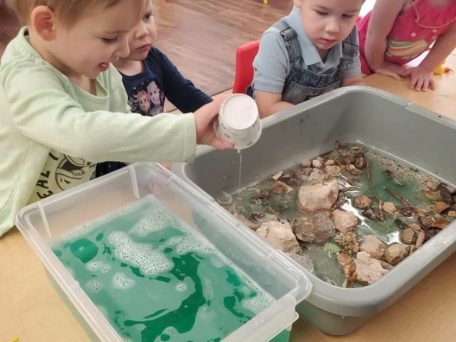The studies are in. Preschools have been shown to help children throughout their life, from their first day of school all the way to adulthood. Most parents probably realize that preschool is beneficial to children, but when are children ready to start?
Preschool is good for children under the age of five. Every child is unique, so it’s important to pay attention to your individual child’s readiness signs to decide when they should take their first steps through preschool doors.
Transitions
A big part of a day at preschool is transitioning from one activity to another. They transition from being in their parent’s care, to being in the care of their teacher. They may be asked to transition from play time to lunch time, from circle time to outdoor play.
Many young children struggle with transitions. While it’s not a requirement for children to handle transitions well, especially if they are not neurotypical, coping well with transitions is a great sign of readiness.
If you’re not sure, you can practice transitions at home. How well does your child respond to being moved from one area to another, even if it’s in your own home? Practicing these transitions is a great way to help them prepare for preschool and give you an idea of how they’ll respond.
Communication
How well can your child express his or her needs? Can they ask for more food if they are hungry, or let the teachers know if they feel too hot and need to cool down? Even if your child isn’t very verbal yet, if they can sign for what they want or communicate their needs in another way, it can make preschool much easier for them.
Following Directions
If you ask your child for a specific toy, can they bring it to you? It’s extremely helpful to your child’s experience if they have practiced following instructions before. Luckily, practicing following directions is easy.
All you have to do to ensure your child has learned how to follow directions is to practice, even if it’s a very simple direction. It could be putting on their socks and shoes, being asked to bring their coat, or any other small thing. As long as they have been asked to do something in the past, and were able to follow through with that, they’ve had some practice on following directions.
Learning how to follow directions makes their experience so much easier during their first few days at preschool.
All of these things are signs that your child is ready for preschool, but don’t worry if they don’t have these things mastered yet. Some children may not meet all of these signs of readiness but could still be ready for preschool. An example might be a child who is otherwise ready but has a speech delay.
If a child is speech delayed, they may actually benefit from preschool since they will spend their time in a more language rich environment.
There’s also good evidence that even young infants can benefit from being in an enriched, learning environment. Young children who attend a daycare or preschool are typically more adaptable, have better immunity, and learn more appropriate social behavior than those that don’t.
If you’re unsure, call your local preschool and ask about whether your child may be ready for preschool or not. They’ll be able to help you figure out if your child is ready to begin their journey into early learning.








